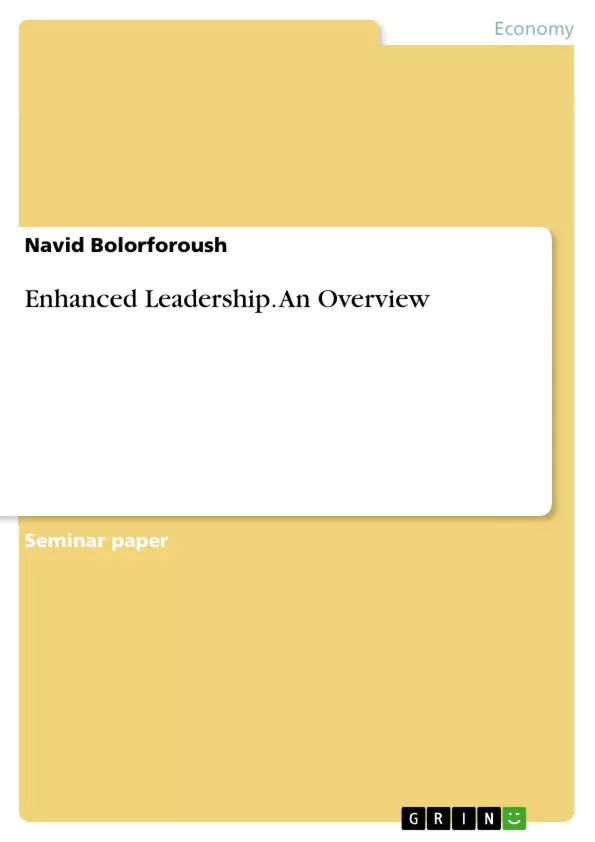Leadership has been a topic of investigation for many decades due to competitive nature of the global economy and emergent prominence of corporate governance. The literature on the topic is abundant and wide range of existing studies can seem disjointed at times. However, over the past 80 years, leadership theories have seen four key generations: trait theories, behavioural, contingency and transformational theories. It is important to note that these theories are not merely exclusive or comprehensive on their own but follows a progressive pattern (Maurik, 2001). This means that there have been elements added or included from one generation to the next that link one to the other and the root can be traced back to sixteenth century in military history, major religions and politics (Safferstone, M., 2007). This is because most significant organisations in the eighteenth and nineteenth century were ‘military’ with strong hierarchical structure. In such frameworks leadership played a major role in creating stability and maintaining the status quo. Whilst the principles used were to manage conflicts, control crisis or even convince groups to acts as desired, the values and perceptions related with management and supervision were not clearly defined (Douglas, 2010). Therefore, many intellectuals argue that the old/traditional theories related to leadership and management may not suit contemporary organisational structures. Nevertheless, most traditional principles stress on common characteristics and behaviours that a leader possesses and his unique ability to control, direct and influence followers to desired outcomes (Gibney, 2009). On that note, Burns (1978) argues that the notion of leadership formed with emphasis on leaders’ traits and personalities and these characteristics are still emphasised in contemporary organisations and cannot be overlooked. [...]
Inhaltsverzeichnis (Table of Contents)
- Leadership Theories - Evolution and Development
- The Rise of Situational Leadership
- The Influence of Culture and Gender
- Traditional vs. Modern Leadership Approaches
- Transactional and Transformational Leadership Styles
Zielsetzung und Themenschwerpunkte (Objectives and Key Themes)
This text explores the evolution and development of leadership theories, focusing on their historical context, key principles, and implications for modern organizational structures. It examines the transition from traditional, trait-based leadership models to more situationally-oriented and transformational approaches.
- The historical evolution of leadership theories
- The significance of situational factors in leadership effectiveness
- The influence of cultural and gender dynamics on leadership styles
- The contrasting features of traditional and modern leadership approaches
- The role of transactional and transformational leadership in contemporary organizations
Zusammenfassung der Kapitel (Chapter Summaries)
- Leadership Theories - Evolution and Development: This chapter traces the evolution of leadership theories from the early trait-based models to contemporary approaches. It highlights the progressive nature of these theories, emphasizing that each generation builds upon the previous one. The chapter also examines the historical roots of leadership principles in military history, religions, and politics.
- The Rise of Situational Leadership: This chapter explores the shift from a focus on individual leader traits to a more situationally-dependent perspective on leadership. It discusses the limitations of traditional approaches, including the assumption of universal leadership qualities and the exclusion of situational influences. The chapter also introduces different leadership styles and their applicability based on follower maturity levels.
- The Influence of Culture and Gender: This chapter examines the impact of cultural and gender factors on leadership styles. It discusses how Hofstede's research highlights the influence of national and organizational culture on leadership effectiveness. The chapter also explores the potential differences in leadership styles between men and women, while acknowledging the importance of context and individual variation.
- Traditional vs. Modern Leadership Approaches: This chapter contrasts traditional and modern leadership approaches, highlighting their key differences in terms of organizational structure, communication styles, and leadership values. It emphasizes the importance of building relationships and fostering participation in modern organizations.
- Transactional and Transformational Leadership Styles: This chapter explores two prominent contemporary leadership styles: transactional and transformational leadership. It analyzes the characteristics, strengths, and weaknesses of each approach, emphasizing their implications for organizational performance, employee motivation, and sustainability.
Schlüsselwörter (Keywords)
This text focuses on leadership theories, their historical evolution, situational factors, cultural and gender influences, transactional and transformational leadership, and contemporary organizational structures. Key concepts include trait theory, behavioral theory, contingency theory, transformational leadership, transactional leadership, organizational culture, leadership style, follower maturity, and leadership effectiveness.
Frequently Asked Questions
What are the four main generations of leadership theories?
The four generations are trait theories, behavioural theories, contingency (situational) theories, and transformational theories.
How does transformational leadership differ from transactional leadership?
Transactional leadership focuses on exchanges between leaders and followers (rewards/punishments), while transformational leadership seeks to inspire and change followers to achieve higher goals.
How do culture and gender influence leadership styles?
National and organizational cultures shape leadership effectiveness. Gender can also influence styles, although modern research emphasizes individual variation and context over stereotypes.
What is the core idea of situational leadership?
It suggests that there is no single "best" leadership style; instead, effective leaders adapt their style based on the situation and the maturity level of their followers.
Why are traditional leadership principles still relevant?
Traditional theories emphasize foundational traits and behaviors that remain important in directing and influencing followers, even in modern, flatter organizational structures.
- Citar trabajo
- Navid Bolorforoush (Autor), 2015, Enhanced Leadership. An Overview, Múnich, GRIN Verlag, https://www.grin.com/document/378293



